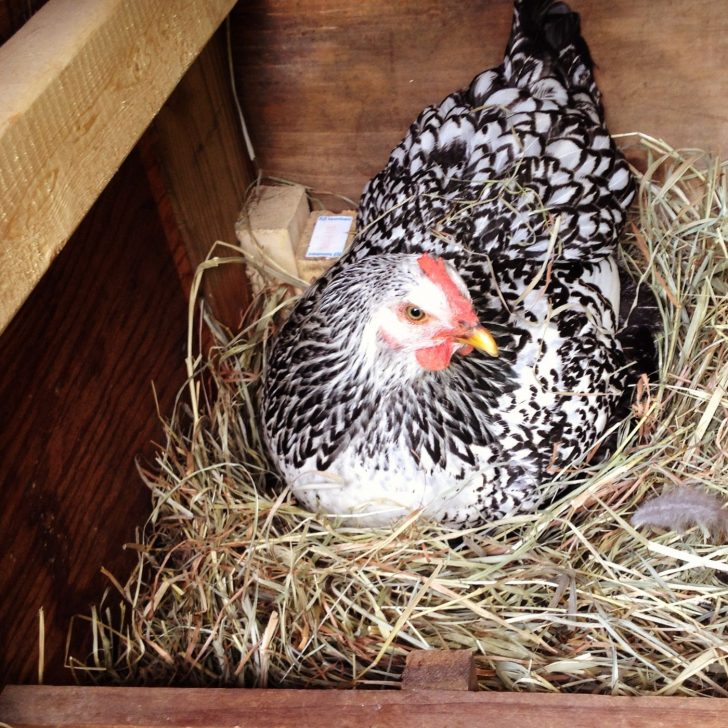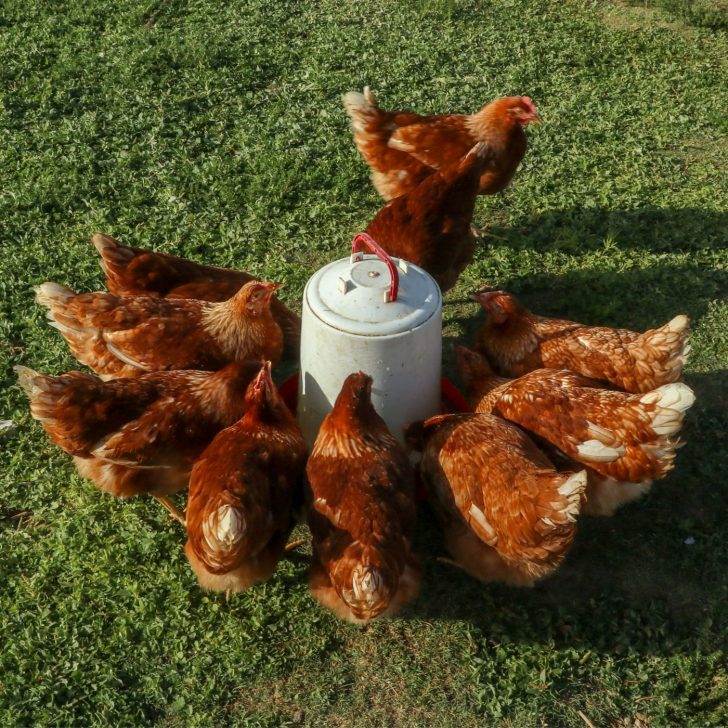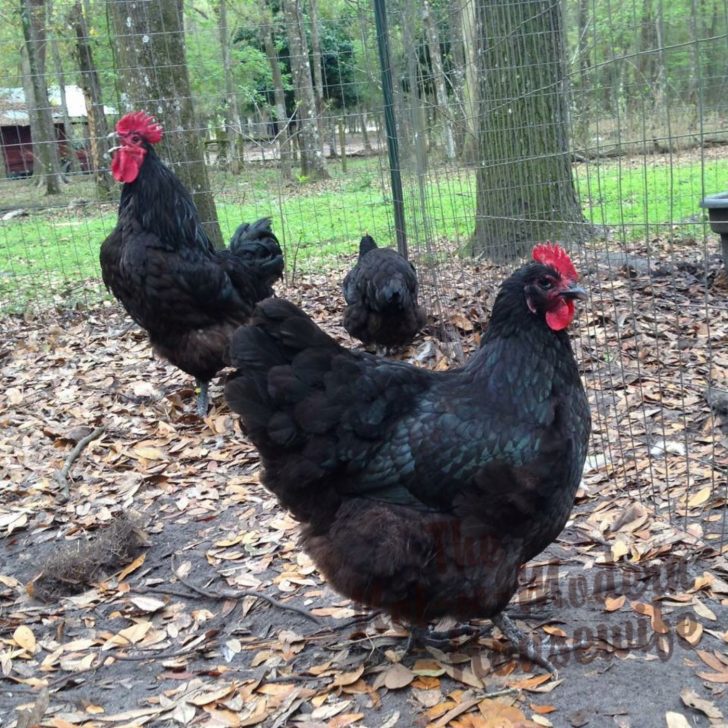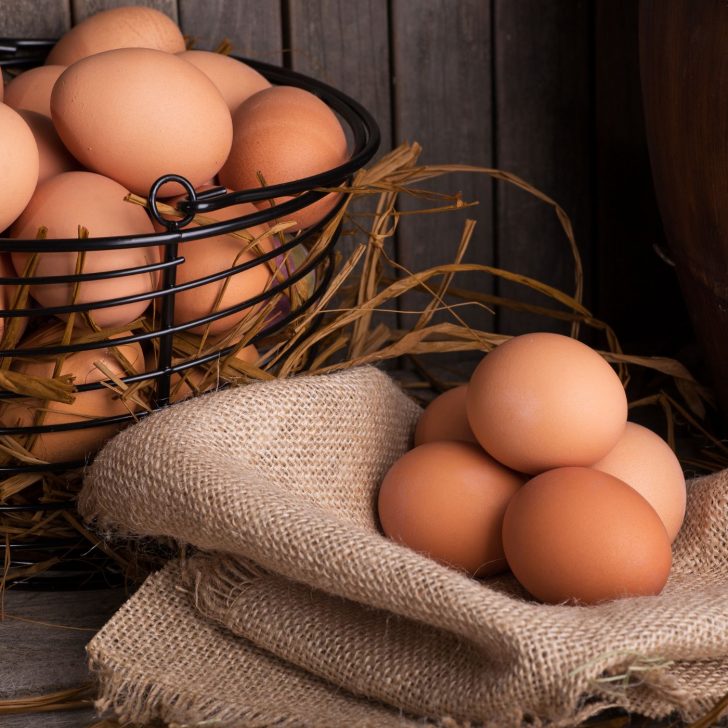Welcome to our comprehensive guide for raising backyard chickens for eggs! If the idea of farm-fresh eggs every morning has captured your imagination, or if you’re looking for a unique way to bring a little more joy (and a few more feathery friends) into your life, you’ve strayed into the right coop.
But don’t worry! I won’t just throw you in the deep end. I’ve put together a 12-step guide that will have you strutting around your backyard with confidence in no time. So, whether you’re a budding chicken enthusiast or a seasoned hen whisperer looking for a few extra tips, stick around, and let’s embark on this fantastic journey together!
Table of Contents

Choose Your Chickens Wisely
Choosing the right chicken breed is like stepping into a world of exciting possibilities. It’s the first real decision you’ll need to make and often the most fun. The breed you choose largely depends on your specific needs and environment.
Each breed has its unique characteristics and quirks. Some are prolific layers bent on filling your breakfast table with the freshest eggs, while others are better suited for their meat. Some breeds thrive in colder climates and those that prefer the heat. Some are docile, perfect for families with young children, and others are more spirited, keeping you on your toes.
And let’s not forget about the ‘show girls’ of the chicken world, the fancy breeds with feathered feet, frilly plumage, and vibrant colors. They might not be the best layers or the sturdiest birds, but they sure do make your backyard look like a chicken fashion show!
So, choosing the right chicken breed is essential. It’s about balancing your own chickens wants, needs, and the environment in your backyard. Remember, happy chickens mean plentiful eggs, meat, feathers, and, most importantly, a lot of clucking fun!

The Top Picks for Backyard Chickens
Let’s dive into some of the most popular and well-loved chicken breeds for backyard chicken enthusiasts:
- Rhode Island Reds: The all-rounder! They’re famous for their hardiness and laying a good number of medium to large brown eggs. Plus, the hens are pretty chill, making them a perfect addition to any backyard flock. The boys can be a bit territorial, so you may want to purchase sexed pullets or go for a heritage breeder who selects for temperament.
- Plymouth Rocks: The most common variety for backyard flocks is Barred Plymouth Rocks. These birds are friendly and easy to handle, and they lay beautiful brown eggs. They’re the friend you always wanted!
- Australorps: Record holders in egg laying, these beauties will keep your egg baskets full. They’re docile and easily managed – the dream tenants. This is the breed I selected for my egg-laying flock.
- Sussex: They come in various colors, lay large cream or light brown, and have a sweet temperament. Sussex are the cutest divas you’ll ever meet!
- Orpingtons: Great for the family, these birds are friendly, make good layers, and can also be raised for meat. Talk about multi-tasking!
- Silkies: The supermodels of the chicken world. They have a unique fluffy plumage that feels like silk, hence the name. They might not lay as many eggs, but they sure do know how to strut around your backyard. They also make excellent pets and 4-H projects if you have kids.
Remember, the right breed for you depends on your individual needs, climate, and what you want from your chickens. Happy chicken raising and hunting!

House Them Properly
When it comes to housing your feathered friends, one size doesn’t fit all. Building or buying the right chicken coop is just as important as selecting the perfect breed. Your coop should be a fortress of comfort and safety.
First off, space is key. Each bird should have at least 4 square feet inside the coop and about 10 square feet in the run. Overcrowding can lead to pecking, disease, and a whole lot of chicken drama you don’t need.
Next, make sure the coop is ventilated, but not drafty. You want fresh air to flow through, but not at the expense of your hens turning into chicken popsicles in the winter. And speaking of weather, your coop needs to be waterproof. Wet chickens are unhappy chickens and damp conditions can cause illnesses.
Now let’s talk predators. Raccoons, foxes, and even neighborhood dogs can be a threat. Make sure your chicken palace is Fort Knox. Install a lock that requires opposable thumbs and bury your run fencing at least a foot underground to deter diggers. If a toddler can open your chicken coop, so can a raccoon.
Lastly, consider ease of cleaning because believe me, you’ll be doing it often! A removable roof or rear-access door can be a lifesaver. And don’t forget the nesting boxes for your ladies to lay their precious eggs.
You’ll want your nest boxes low to the floor with roosting bars higher up to account for their instinct to sleep high up to avoid predators. Higher roosting bars will also prevent hens from sleeping in the nest boxes and getting them unnecessarily dirty.
Remember, your chicken coop isn’t just a house, it’s a home. So, make it a good one! Your chickens will repay you with countless eggs, fun, and feathery friendship.

Provide Room to Roam
Just like you and me, chickens love their freedom and outdoor time. Giving your backyard chickens plenty of space to roam is not just a nice gesture, it’s essential for their well-being. Let’s get into the why.
First off, when chickens are allowed to forage freely, they eat a natural diet full of bugs, grass, and seeds, which leads to healthier, tastier eggs. It’s a win-win situation. Your omelets will never taste better than with your own eggs, trust me! Plus, their yolks will have a beautiful, rich color that you won’t get from store-bought eggs.
Secondly, free-range chickens are happier chickens! They get to enjoy the sunlight, dust bath, and explore their surroundings. This kind of life reduces stress for them, and a happy chicken is a productive chicken.
Lastly, giving your chickens enough room to roam can help keep the peace in the coop. Like any other pets, chickens need their space to prevent squabbles. Too much togetherness can lead to pecking and other forms of bullying among the flock.
Remember, a spacious backyard not only allows for healthier and happier chickens but also makes for a more enjoyable backyard chicken-keeping experience for chicken owners. So, let them spread their wings and explore – it’s nature’s way!

Feed Them Well
Just as you wouldn’t thrive on a diet of junk food, neither would your chickens. Providing a balanced diet is crucial for your feathered friends. Healthy chickens lay healthier, tastier eggs – it’s as simple as that!
A well-rounded chicken diet includes grains, proteins, and fruits and veggies. Start with a good-quality, complete feed that’s designed for backyard chickens. This will cover your bases for all the chickens’ essential vitamins and minerals they need. Here’s a fun fact: chickens need grit (small rocks) in their diet to help their gizzard grind up food. So, make sure there’s plenty available for them to peck at.
On top of the basics, supplement their diet with kitchen scraps. Think leafy greens, apple cores, and carrot peels. But remember, not all kitchen scraps are chicken-friendly. Avoid feeding them anything salty, fatty, or sugary. And absolutely no caffeine or alcohol – those are big no-nos.
Oh, and here’s another tip – chickens love bugs and worms! These little critters are packed full of protein and will keep your flock in tip-top shape. So, go ahead, and let them do some natural foraging in your garden. Bonus: it’s like having your very own, all-natural pest control!
In conclusion, a well-fed chicken is a happy chicken, and happy chickens lay the best eggs. So, treat their diet with the same care you’d treat your own. After all, you are what you eat – and that’s doubly true for your backyard chickens!

Keep Them Hydrated
Just like humans, chickens need access to plenty of clean water to stay healthy and happy. Water makes up around 70% of a chicken’s body weight – that’s a lot! So, it’s no surprise that dehydration can quickly become a serious issue for these feathered friends.
Make sure your chickens have constant access to fresh, clean water. This means regularly changing out their water source and keeping it free from any debris or contaminants. You can also add a small amount of apple cider vinegar to their water to help prevent bacteria growth and promote digestion.
If you live in an area with extreme temperatures, you’ll need to take extra care in ensuring your chickens stay hydrated. In hot weather, consider adding electrolytes or a small amount of salt to their water to help replenish any lost nutrients. In cold weather, make sure their water doesn’t freeze by using a heated base or changing it out more frequently.
Remember, a well-hydrated chicken is a happy and healthy chicken. So, always keep an eye on their fresh water and supply – your feathered friends will thank you for it!
Ensure Proper Care
Just like us humans, our feathered friends may occasionally run into health issues. Ensuring proper care extends beyond feed and hydration to include monitoring their health and addressing any medical needs promptly.
Chickens are pretty hardy creatures, but they’re not invincible. Common issues can range from mites and lice to respiratory problems and parasites. Regularly check your chickens for any signs of illness such as changes in behavior, loss of appetite, irregular egg laying, or physical abnormalities.
Remember, early detection is key, and your swift action can make all the difference. Don’t be afraid to consult a vet if things seem out of the ordinary. After all, keeping your backyard chickens healthy isn’t just about producing top-notch eggs – it’s about respecting the well-being of these lovable cluckers! So, keep your eyes peeled, your hands ready, and your heart open. Your chickens are counting on you!

Socialize With Your Chickens
The importance of socializing with your chickens cannot be overstated. These feathered friends are social creatures by nature and truly thrive on interaction. Spending quality time with your flock doesn’t just build trust, it also helps you better understand their individual personalities, quirks, and behaviors.
Just like pets, each chicken has its own unique character. Some may be bold and adventurous, while others may be shy and reserved. Noticing these traits can be half the fun of chicken ownership, and it can only happen when you spend time interacting with them. You’ll be amazed at the depth of personality that can come from a creature so small!
Moreover, frequent interaction allows you to monitor their health more effectively. By observing them regularly, you’ll become familiar with their normal behavior, making it easier for you to spot any deviations that may signal a health issue.
So, don’t just look at your chickens from afar—get in there and mingle with your feathered friends! Remember, when it comes to backyard chickens, quality time is more than just a luxury—it’s an essential part of their care and well-being. Your chickens are not just egg-laying machines; they are members of your family, deserving of love, care, and companionship.

Keep Them Entertained
Just like us humans, chickens need a little fun in their lives too! Enrichment is an essential part of their lives, and a well-entertained chicken is a happy chicken. Believe it or not, these brainy birds get bored easily, and a bored chicken can be a destructive one. They might start pecking on each other, or even worse, become easy targets for predators due to their lack of interest in their surroundings.
One way to keep your charming cluckers entertained is to provide them with toys. Yes, you heard it right, chicken toys! These can be as simple as a mirror (chickens are quite the vain birdies), a xylophone, or even a simple ball. You’ll be surprised how much fun they can have pecking at these items.
Another great way is to let them have a good scratch and dig in a dust bath. They’ll wallow and kick, flipping dust everywhere. Not only is it fun for them, but it also helps keep parasites at bay.
Lastly, chickens love to forage. Scatter a handful of grains or mealworms around their area and watch them go to town! It’s like a treasure hunt, and it keeps them active and engaged.
Remember, a little creativity and effort can go a long way in ensuring your feathered friends are living their best lives. After all, happy chickens lay happy eggs!

Learn Their Language
While chickens may not be able to talk like humans, they do have their own way of communicating with each other. By learning their language, you can better understand their needs and wants, leading to a stronger bond between you and your flock.
For example, did you know that a loud clucking sound usually means danger? If your chickens are making this noise, it’s important to investigate and make sure they are safe. On the other hand, a soft purring sound is a sign of contentment and can be heard when they are happily foraging or taking a dust bath.
By paying attention to their body language and vocalizations, you can become fluent in chicken-speak and provide better care for your feathered friends. Plus, it’s always fun to have your own secret language with your pets!
Manage Their Waste
Ensuring that your chicken coop is clean isn’t just about aesthetics – it’s crucial for the health and happiness of your feathered friends. A dirty coop can become a breeding ground for pests and diseases, which could put your entire flock at risk. Plus, nobody likes the smell of a dirty chicken coop, right? Regular cleaning helps keep any unpleasant smells at bay, making your backyard a more enjoyable place to spend time.
When it comes to manure management, having a plan is a must. Chicken manure is high in nitrogen, which makes it a fantastic fertilizer for your garden. However, it’s important to compost it first to kill any potential pathogens and to balance the nitrogen content. Not much of a gardener? No worries! You can bag up the manure and offer it to local gardeners or community gardens. They’ll likely be more than happy to take it off your hands.
Remember, a clean coop leads to healthy, happy chickens, and who doesn’t want that? So, roll up your sleeves, grab that pitchfork, and show that coop who’s boss! Your chickens (and your neighbors) will thank you.

Learn About Egg-Laying
You might be wondering, “How do you raise chickens that lay eggs?” Well, let me explain. Chickens typically start laying eggs around 5 to 6 months old, and their egg production is influenced by factors such as nutrition, environment, and daylight hours. You see, chickens need about 12-14 hours of daylight to lay eggs consistently. This is why your hens may lay fewer eggs in winter when the days are shorter.
Now, improving egg production is all about taking care of the basics. First off, providing a balanced diet is crucial. Layer feed is specially designed to provide all the nutrients your hens need to lay delicious, nutritious eggs. Adding calcium to their diet, either through oyster shells or crushed eggshells, will also ensure strong, healthy eggshells.
Next, let’s talk about environment. Chickens need a calm, safe place to lay their eggs. Ensure your hens have plenty of space, clean nesting boxes, and feel safe from predators.
Finally, hydration is key. Just like you and me, chickens need plenty of fresh, clean water—especially in the heat of summer. Dehydration can cause a drop in egg production, so keep an eye on their water intake.
So, there you have it! A little understanding and a few simple steps can take your egg game from good to egg-cellent. Take care of your hens, and they’ll reward you with a steady supply of fresh, farm-to-table eggs. You can’t beat that!
Prepare for All Seasons
Just as you swap out your wardrobe with the changing seasons, you’ve got to adjust your hens’ living conditions too. Spring, summer, autumn, or winter, each season brings its unique challenges, but also opportunities for your feathery friends.
Let’s start with the hot summer months. Just like us, chickens can suffer from heat stress, so it’s essential to keep their coop well-ventilated and provide plenty of shade. A little trick I’ve learned is to freeze some treats in ice blocks for a refreshing peck-me-up.
When it’s autumn, and leaves are falling, your hens will love scratching around in leaf piles. But be sure to keep their run free of damp leaves, which can harbor mold and parasites. And remember, with the days getting shorter, you’ll have laying hens will need to adjust their light exposure to keep those eggs coming.
Winter, you ask? It can be tough on your hens. Chickens are surprisingly resilient to cold, but they don’t like drafts. Insulate the coop, but be sure to allow for ventilation to prevent moisture buildup, which can lead to frostbite. A heated waterer can prevent their water from freezing over.
And then it’s spring again, a great time for your hens as they can enjoy the outdoor and fresh greens. But watch out for muddy conditions, which can lead to disease. Keep the run well-drained to prevent puddles and mud.
So, in a nutshell, adapt your care for your backyard chickens to the rhythm of the seasons. They’ll appreciate the effort, and in return, you’ll get happy, healthy hens laying those delicious eggs all year round!

Final Thoughts
In conclusion, raising backyard chickens is not just a hobby, it’s a lifestyle that offers a multitude of rewards and experiences. With each passing season of raising chickens, you will encounter unique challenges and opportunities that will deepen your connection with these delightful feathered friends.
Imagine the joy of stepping into your backyard oasis, surrounded by the gentle clucking of your beloved hens. As you enter their cozy coops, you’ll be greeted by the warm and earthy scent of fresh straw and the soft rustling of feathers. Their bright eyes will meet yours, filled with trust and anticipation, as they eagerly await your arrival.
Every day, you’ll have the pleasure of providing them with nutritious feed, ensuring their bellies are always content. You’ll carefully tend to their needs, ensuring their coops are clean and comfortable, offering them a haven where they can rest and lay their eggs in peace.
So, my friend, embrace the cluck and embark on this wonderful journey of backyard chicken-keeping. Discover the beauty of this lifestyle, as you immerse yourself in the rhythms of nature and forge a lasting connection with these captivating creatures. Your backyard will transform into a sanctuary of joy, where the simple act of caring for your hens becomes an enriching and fulfilling experience. Enjoy every moment, and let the enchantment of raising backyard chickens become a cherished part of your life.
Frequently Asked Questions
How many chickens should a beginner start with?
While it may be tempting to start with a large flock, it’s best to begin with just a few chickens. Generally, 3-4 chickens are a good number for beginners as they are easier to manage and require less space and resources. As you gain more experience and confidence, you can gradually add more chickens to your flock if space allows.
How many chickens do you need for eggs?
On average, a healthy hen can lay around 5-6 eggs per week. So, depending on your personal egg consumption and the size of your family, you may need anywhere from 2-4 chickens to provide enough eggs for your household.
Are backyard chickens loud or messy?
Backyard chickens are relatively quiet and low-maintenance compared to other pets. They make soft clucking noises and only become louder when they are laying eggs or feel threatened. As for the mess, it’s important to regularly clean their coop and provide proper bedding to keep things tidy. Overall, with proper care and management, backyard chickens can be a peaceful addition to your household.
Do I need a rooster for my hens to lay eggs?
No, you do not need a rooster for your hens to lay eggs. Hens will naturally lay eggs without the presence of a rooster. However, if you do have egg laying hens and decide to keep a rooster, be aware that they can be noisy and may become aggressive towards humans and other animals. It’s important to research and consider carefully before adding a rooster to your flock.
Are chickens high maintenance?
Chickens can require a moderate amount of attention and care, but they are not considered high-maintenance pets. Daily tasks such as feeding, providing clean water and collecting eggs are necessary, along with weekly tasks like coop cleaning and monthly tasks like trimming their nails. However, compared to other types of livestock, chickens are relatively low-maintenance animals.
Will chickens stop laying if the coop is dirty?
Yes, chickens may stop laying eggs if their coop is dirty or unsanitary. They are natural foragers and clean animals, and a dirty environment can stress them out and decrease egg production. It’s important to regularly clean and maintain the coop to ensure happy and healthy hens.
Are backyard chickens worth it?
In my opinion, yes! Backyard chickens can be a worthwhile investment for many reasons. Not only do they provide fresh and nutritious eggs, but they also make great pets and can help reduce food waste by eating scraps from your kitchen. Additionally, caring for chickens can be a fun and rewarding experience, especially if you involve the whole family in their care.
